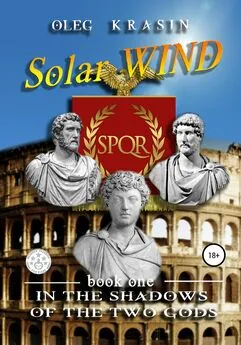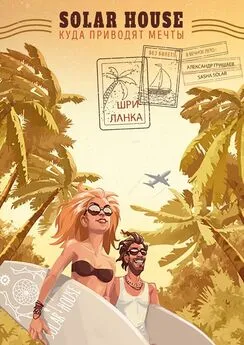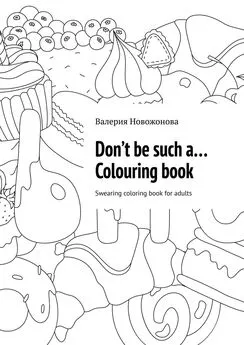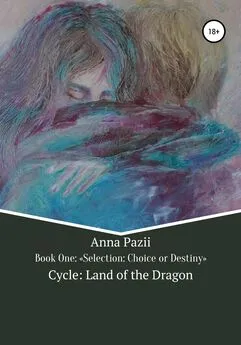Oleg Krasin - Solar Wind. Book one
- Название:Solar Wind. Book one
- Автор:
- Жанр:
- Издательство:неизвестно
- Год:2022
- ISBN:нет данных
- Рейтинг:
- Избранное:Добавить в избранное
-
Отзывы:
-
Ваша оценка:
Oleg Krasin - Solar Wind. Book one краткое содержание
MARCUS AURELIUS ANTONINUS
The emperor-philosopher, for a moment, thanks to him, the world was governed by the best and greatest man of his age.
Solar Wind. Book one - читать онлайн бесплатно ознакомительный отрывок
Интервал:
Закладка:
Heading the race was Green. As Marcus understood from Faustina's explanations, it was Geminas, a man who belonged to Ceionius. Commodus himself also shouted loudly from his seat, as well as his children sitting next to him—Fabia and Lucius. Unsatisfied wife Avidia screamed furiously, and her cry seemed to Marcus to look like a tantrum.
The conversation between his aunt and mother, which he unwittingly witnessed, made him look at the woman. She was short in stature with a pretty face. A scarf is put on her head, her hands are hung with gold bracelets, glistening dimly in the sun. She showed Ceionius on a charioteer in green and said something loudly.
For a while, Geminas led the race. They swept a few laps, and already six balls removed a special slave, indicating that the final seventh round remained. Suddenly, Agaclytus' horses raced like madmen, and he almost overtook the leader. The fans seemed to go crazy. Faustina jumped up. Clutching Marcus's shoulder painfully, so as not to fall, she wailed, stomping her feet and swearing rudely, like some proletarian from the poor quarters of Rome.
“Go ahead, go, go Agaсlet!” she screamed loudly. “Go! Go! Oh, lazy cattle!”
Having visited horse racing before, Marcus was not surprised by the behavior of his aunt, such she was, his relative was passionate, wayward, and frivolous.
Meanwhile, Agaclytus matched Geminas, and they rushed side by side, grinning their teeth, standing out with white stripes on their dusty gray faces, furiously quilting their whips on the backs of horses. There was a final turn before the finish line.
Tension among viewers had reached unprecedented levels, and even Marcus jumped up from his seat. Like everyone else, he shouted loudly, stomped, waved his arms. It was like he’d gone mad with the crowd. Where did his remarkable calmness go? Where did the philosophy go of the cynics and stoics, which he absorbed from Diognetus and Alexander of Cotiaeum?
He felt in himself something primitive, dark, eclipsing the mind, as if he captured the spirit of a predator, requiring to catch up and torment the enemy, to enjoy his blood. And he unwittingly carried his thoughts into the arena, imagining himself in a blue tunic. It was he, Marcus, rushing in the dust along the Circus, he beat the horses with force with the whip, his white teeth, ready to gnaw at the throat of the opponent.
Meanwhile, at the turn of the quadriga of the green charioteer hit the wheel of the cart Agaclytus and he flew out of it, as if a stone from the sling, rolling to the side. It was over. No, blue today didn't have a chance to celebrate triumph.
After Faustina’s races, Domitia and Marcus went to horse stalls to learn about Agaclytus’ health—such a slave, a skilled rider, was expensive. Ceionius, satisfied with the victory of his quadriga, had already come down. His arrival was announced by two heralds, whom he attached golden-winged wings on his back. This was a fashionable innovation for Rome.
“Consul Ceionius Commodus!” they proclaimed with trumpet voices, warning about the appearance of the magistrate. Such undisguised narcissism of Ceionius in many caused a smile.
“Faustina! Domitia!” the Commodus greeted both matrons at ease, lazily stretching the words. “It's good to see you both on the run I spend as a consul. I hope you liked it, despite the unfortunate loss of yours, Faustina, the quadriga.”
“Yes, it is!” Faustina said in a disgruntled voice. “However, I have long wanted to give Agaclytus to my nephew.” She turned to Marcus. “Will you accept my gift?”
“Of course, auntie!” Marcus politely bowed.
“Well, now we're going to compete with Marcus,” Ceionius laughed. “That’s funny!”
A little away from the masters stood their charioteers Geminas and Agaclytus; the charioteer of Faustina, with a grim look, rubbed the places bruised in the fall. Marcus noticed how he looked at his mother Domitia, at Faustina the Elder, and in his eyes, there was a hidden audacity with which men usually look at women.
“Agaclytus, come!” Ceionius called him.
A young, short stature Greek came up and leaned easily, depicting reverence. “I'm here, master.”
Ceionius approached him, with the look of a connoisseur groping his shoulders and arms.
“Listen, Marcus,” he said, “since Faustina has given you Agaclytus, will you give him to me? I'll pay a good price. You don't need a quadriga, and I keep the stables.”
“Don't bother, Ceionius. I have not yet issued a gift," Faustina was ahead of Marcus with the answer.
“Well, as you like, I don't really need it. My Geminas is still the best!”
Ceionius smiled, but Marcus noticed evil light in his eyes. Although Hadrian's chosen one was known as a vain man, an empty, harmless and foolish, who never crossed the road to anyone, except for Servianus and Fuscus, but he was able to be angry. And it was now becoming clear.
Meanwhile, his son Lucius approached the consul. He was about five years old, but he was already very much like his father. This ball was a large boy, low forehead, with straight eyebrows resembling an elongated thread that separates a small forehead from the rest of the face.
“Lucius, my son, say hello to Marcus and his relatives,” said Ceionius skillfully extinguished his discontent and becoming kind again.
The boy said something that was murmuring, shy.
“Oh, he's so unsociable. He should be taught to educate,” his father lamented. “Can you help us, Marcus? Come more often. By the way, a fashionable philosopher from the school of stoics Apollonius from Chalcis recently came to Rome, and I invited him to study stoicism.”
“Obviously he's going to come, Ceionius,” Domitia said. Throughout the conversation, she was silent, embarrassed for Faustina, for her obvious rudeness, and now, with her politeness, she tried to smooth the awkwardness hanging in the air.
“I'll be glad of you, Marcus!” Once again, Ceionius smiled, and left the horse stalls, accompanied by the lictors and customers, who stood with a respectful look on the sidelines all this time.
Stoic exercises
In the summer, the unexpected news that Empress Vibia Sabina had died suddenly swept through Rome. No one knew why. There was no news on this account, and it was left to guess. Domitia Lucilla sadly walked around the house and, looking at her, Marcus felt that difficult times were coming.
He did not know the Empress intimately, saw her only a few times—in the palace on Palatine, in the Great Circus, and she did not give the impression of a sick woman. She was about fifty, not yet the age to meet the gods. And suddenly a sudden death! Now his only patron at the court, the woman who brought Marcus closer to Hadrian, disappeared. At least that's what Domitia said.
Regin, who brought this sad news, hinted that Hadrian had poisoned her. Allegedly, she was too zealous in defending the interests of Marcus and the family of Annius, and Caesar, who decided to bet on the Ceionius, did not like it. But Marcus thought that didn't sound convincing enough to kill her. Something must be more important and significant, because a person was not so easily deprived of life.
“Marcus, you haven't been to the Ceionius’s for a long time,” the mother remarked after speaking to great-grandfather. “Now, because of the death of the esteemed Sabina, we need to be especially friendly with them. Besides, Ceionius invited you to visit his palace on the run.”
And Marcus, as an obedient son, heeded his mother's request.
Taking with him a large, slow Antiochus, his constant companion, he went to visit his future relatives. He did not count on having a conversation with Fabia, because she was in her mother's room. Probably, they were engaged in a purely feminine occupation—weaving wool cloth or spinning yarn. Or maybe they studied philosophy, as now noble Romans do it. But the visit to Ceionius meant an expression of reverence on the part of the Annius family, and, specifically, Marcus. Responsibility here fell on his shoulders because he was the youngest member of their family. Although Marcus did not yet have the proper political experience, he felt that such an act would be true, and he would grow up in the eyes of Emperor Hadrian.
“It's the right thing to do,” Marcus thought. “I'm doing the right thing! It is not for nothing that Caesar called me Verissimus.”
They descended down the narrow streets, down into the valley between the hills, built up by the insulas so closely that it seemed impossible to breathe here because of the unimaginable crowding. Only fountains, hitting at many intersections, somewhat enlivened the general view and slightly refreshed the air. Near each fountain there was a small statue of the patron or patron of the street, and maybe the whole area.
Marcus looked up. Sky blue almost did not peek through the narrow slots between the roofs, but the hot air reached here, down to the sidewalks paved with hewn stones.
It was noisy outside. Some of the insulas heard loud voices of women who traded with sellers in all sorts of things. The not lubricated wheels of the carts transporting the forest for construction creaked. The slaves and the freedmen, who were making their way through their business, were elbowing. They said loudly, “Salve!” 51 51 Bless you! (Latin)
greeting acquaintances and clapping each other's shoulders. And the cry of street dogs twirling underfoot completed this cacophony.
At one of the turns, Marcus and his slave suddenly encountered Ceionius on a stretcher, which was carried by strong Germans. Mindful of the case of Rufus, Ceionius had now picked up the porters of former German barbarian warriors, hard and strong. Despite the slaves, Ceionius was accompanied by six lictors from among the freedmen, each of whom was carrying a fascia on his shoulders. 52 52 Beams of knitting or birch rods stretched with belts. In Rome, the symbol of the protection of state power.
The yellow fabric of his palanquin was painted with red roses, which indicated the peculiar taste of the owner—like other superficial people, Ceionius loved to create the appearance of a lover of everything extravagant. He lay down, opening the curtain, and lazily looked at the city bustle. Noticing Marcus, Commodus perked up, leaning out of the stretcher.
“Marcus! Where are you going?”
“To you, dear Ceionius.” Marcus tried to speak with dignity, as befits an adult man. “My mother rightly reproached me for not keeping my promises and not visiting with you since we met at the Circus.”
“Oh, gods, don't measles yourself, we're all like that! Today we say one thing, and tomorrow we forget what we said. Get in my palanquin, I'm just being taken home.”
Marcus climbed into his stretcher and lay down next to Ceionius. He felt a strong fragrance emanating from Commodus, abundantly grated with fragrant incense. Inside the palanquin smelled of roses, frankincense, and musk. On the feet of the consul were not red senator's shoes but sandals, which are usually used to go home. Their gilded straps wrapped the tight calves of Ceionius's legs—he was lying on his side, and his long toga lifted up a little.
“I heard,” Ceionius continued lazily, “that Servianus Fiscus’s grandson had shown inappropriate behavior towards you, and that he had been unruly.”
“Yes, he was defiant.”
“It’s a pity that I was not around, I would find how to respond to the rude. We generally need to stick together; I'm talking about our families. If the gods and the great emperor Hadrian so wish, fate will henceforth lead us along the same road.”
Читать дальшеИнтервал:
Закладка:










